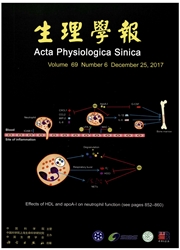

 中文摘要:
中文摘要:
本研究采用大鼠胃缺血-再灌注(gastricischemia-reperfusion,GI-R)模型(夹闭腹腔动脉30 min后再灌注),通过组织学、免疫组化等方法,研究GI-R不同时间(0、0.5、1、3、6、24、48、72 h)对胃黏膜细胞凋亡和增殖的影响.结果发现,单纯缺血30 min胃黏膜损伤较轻,再灌注后损伤逐渐加重,胃黏膜的凋亡细胞迅速增加,而增殖细胞迅速减少;至再灌注后1 h达高峰;之后胃黏膜开始修复,凋亡细胞逐渐减少,增殖细胞逐渐增加;至再灌注后24 h胃黏膜细胞增殖达高峰;再灌注后72 h胃黏膜基本恢复正常.上述结果提示,在GI-R中,胃黏膜损伤主要由再灌注引起,凋亡细胞增加;然后胃黏膜启动自我修复机制,增殖细胞逐渐取代损伤细胞,3 d左右就可基本修复,表明胃黏膜细胞具有很强的自我修复能力.
 英文摘要:
英文摘要:
The effect of gastric ischemia-reperfusion (GI-R) on gastric mucosal cellular apoptosis and proliferation was investigated using histological, immunohistochemical methods in Sprague-Dawley rats. The GI-R model was established by clamping the celiac artery for 30 min and reperfusing for 0, 0.5, 1, 3, 6, 24, 48, 72 h, respectively. Mild gastric mucosal injury was induced by ischemia alone. However, the injury worsened and reached the maximum at 1 h after reperfusion, almost simultaneously with the gastric mucosal cellular apoptosis increase and cellular proliferation decrease in gastric mucosa. Then, gastric mucosal cells began to repair by increasing gastric cellular proliferation, which achieved the maximum at 24 h after reperfusion. The mucosal lesions were almost completely repaired at about 72 h after reperfusion. These results indicate that the gastric mucosal injury after GI-R is mainly induced by reperfusion. The damaged gastric mucosa could initiate its repairing mechanism immediately through inhibiting cellular apoptosis and increasing the number of proliferative cells, which substitute the damaged cells gradually. The plerosis almost completes in three days after reperfusion showing a strong self-repair ability of gastric mucosa.
 同期刊论文项目
同期刊论文项目
 同项目期刊论文
同项目期刊论文
 The role of nuclear factor-kappa B in the effect of Angiotensin II in the paraventricular nucleus pr
The role of nuclear factor-kappa B in the effect of Angiotensin II in the paraventricular nucleus pr Administration of angiotensin II in the paraventricular nucleus protects gastric mucosa from ischemi
Administration of angiotensin II in the paraventricular nucleus protects gastric mucosa from ischemi 期刊信息
期刊信息
